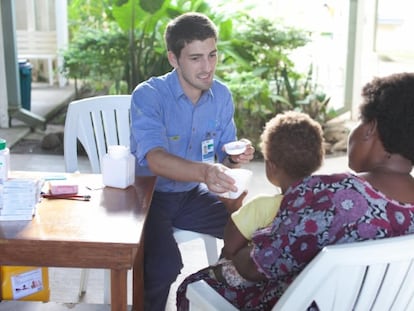Half of all Spaniards don¡¯t know what antibiotics are really for
EU survey shows their use is growing faster here than in any other member state, despite widespread ignorance about their purpose

Half of all Spaniards believe that antibiotics are used to kill viruses, fight colds and treat the flu. This erroneous view is all the more dangerous given that the inappropriate use of this kind of medication only serves to strengthen its real enemy: bacteria, which are becoming increasingly resistant.
An EU report on antimicrobial resistance released this week reveals widespread ignorance about the real purpose of antibiotics in Spain, which scored worse than average.
¡°The rise of resistant microbes is a threat to global public health. It is responsible for the avoidable deaths of humans and animals, increased healthcare and veterinary costs, and productivity losses,¡± reads the report.
Last month, a US woman suffered an infection by ¡°superbacteria¡± that proved immune to the strongest available antibiotics
According to this Eurobarometer survey, 48% of Spaniards said that antibiotics kill viruses, while 37% knew that they don¡¯t, compared with 43% overall in the EU.
A further 45% believe they are effective against colds and flus (against 48% who say this is wrong). In the EU overall, 36% of respondents said antibiotics were good against the flu.
Sign up for our newsletter
EL PA?S English Edition has launched a weekly newsletter. Sign up today to receive a selection of our best stories in your inbox every Saturday morning. For full details about how to subscribe, click
.
Yet a vast majority of Spaniards, 85%, said they are aware that an inappropriate use of antibiotics makes them less effective, in line with the EU average of 84%.
The confusion may be partly attributable to the fact that only 23% of Spaniards said they had received information about these prescription drugs over the last year, compared with the European average of 33%. Those who did receive information mostly did so from their doctor (48%), significantly above the average of 32% for Europe, where people are exposed to public awareness campaigns. Spain has a strategic plan to increase outreach.
Meanwhile, a report by the European Centre for Disease Prevention and Control finds that Spain is increasingly vulnerable to antibiotic-resistant bacteria.
From bad to worse
And things could get worse, judging by the fact that 47% of Spaniards used antibiotics over the course of last year, according to the Eurobarometer. This puts Spain second to Malta (48%) and far above the EU average of (34%).
The survey also shows that between 2013 and 2016, this rate grew nine percentage points, even as it declined by five points in neighboring France and Portugal, and by one point overall across the EU.
The effects of super-resistant bacteria are already being felt. Last month, a US woman suffered an infection by ¡°superbacteria¡± that proved immune to the strongest available antibiotics. It was a sign of things to come, warned the experts.
Health authorities are asking for a more rational use of antibiotics, not just in humans but also in animals raised for human consumption.
English version by Susana Urra.
Tu suscripci¨®n se est¨¢ usando en otro dispositivo
?Quieres a?adir otro usuario a tu suscripci¨®n?
Si contin¨²as leyendo en este dispositivo, no se podr¨¢ leer en el otro.
FlechaTu suscripci¨®n se est¨¢ usando en otro dispositivo y solo puedes acceder a EL PA?S desde un dispositivo a la vez.
Si quieres compartir tu cuenta, cambia tu suscripci¨®n a la modalidad Premium, as¨ª podr¨¢s a?adir otro usuario. Cada uno acceder¨¢ con su propia cuenta de email, lo que os permitir¨¢ personalizar vuestra experiencia en EL PA?S.
?Tienes una suscripci¨®n de empresa? Accede aqu¨ª para contratar m¨¢s cuentas.
En el caso de no saber qui¨¦n est¨¢ usando tu cuenta, te recomendamos cambiar tu contrase?a aqu¨ª.
Si decides continuar compartiendo tu cuenta, este mensaje se mostrar¨¢ en tu dispositivo y en el de la otra persona que est¨¢ usando tu cuenta de forma indefinida, afectando a tu experiencia de lectura. Puedes consultar aqu¨ª los t¨¦rminos y condiciones de la suscripci¨®n digital.











































